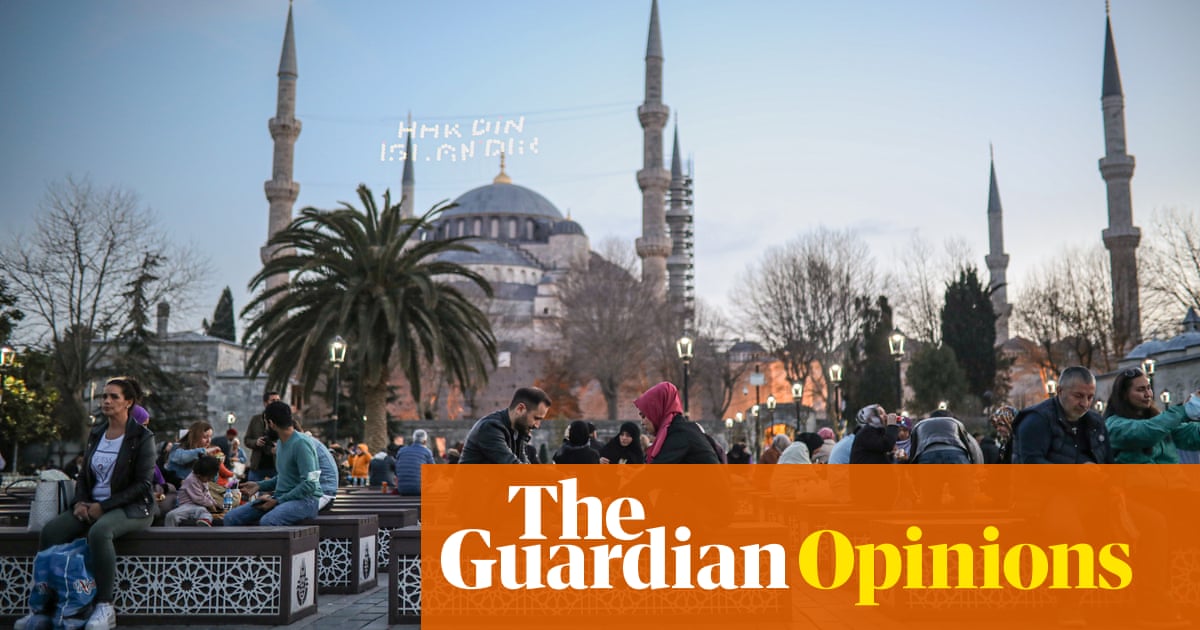
Show caption People eat iftar dinner on the first day of Ramadan in Sultanahmet Square, Istanbul. Photograph: Anadolu Agency/Getty Images Opinion From curbing consumerism to caring for others, Ramadan has lessons for us all Nadeine Asbali For Muslims and non-Muslims alike, the core tenets of the holy month can help us achieve communal and personal change Sun 3 Apr 2022 16.00 BST Share on Facebook
Share on Twitter
Share via Email
Ramadan is here, and Muslims all around the world are starting a month-long spiritual bootcamp: days spent abstaining from food and drink, and nights passed in prayer and contemplation. Mosques brim with life as they open their doors to the young and the old, familiar faces and new ones standing side by side, reciting the same words as more than a billion others around the globe.
This may be the first Ramadan in two years that we can be together in person, but our homes ache with the absence of those stolen by Covid, and for many this year, iftar meals will be meagre as the cost-of-living crisis takes its toll, with 50% of the country’s Muslims living in poverty.
As Ramadan is celebrated in a nation more fractured than ever, it’s not just Muslims who could do with a little of its spirit. It is a common misconception that Ramadan is all about food. In truth, it is about starving the body to feed the soul. By temporarily depriving our bodies of what they need, we forge room for spirituality and introspection, generosity and discipline, to blossom in its place.
Maybe we could all do with more of that in our era, where the self is supreme. Self-care and selfies, self-made and self-sufficient – we live in an individualistic age where the I comes before the we. The pandemic gave us a brief respite from that, as we clapped on our doorsteps and made small talk with the people we had previously ignored. But it didn’t last long. We were soon back to avoiding eye contact on the street, and passing homeless people by as if they were invisible.
Ramadan forces Muslims to uphold the importance of community. We share food with neighbours, and give charity within our means: whether a smile to a stranger or cash to those in need. With the cost-of-living crisis so extreme that people are having to decline produce at food banks because they cannot afford the energy to cook them, imagine if it was the social norm to embody the Ramadan spirit and give so freely that, as the prophet Muhammad (peace be upon him) said, even your left hand doesn’t know what your right has given. Imagine if a family forced to choose between heating and eating opened their door to find a tray of home-cooked food on the doorstep, delivered by an anonymous neighbour.
When poverty is inflicted by the state, manufactured through budget cuts and shifting policy, it falls on us to enact change. A famous Hadith reminds us that nobody can call themselves a Muslim if their own stomach is full while their neighbour is hungry. What if we all lived by this sentiment? Wealth distribution is fundamental to the Muslim understanding of social justice. We are obliged to donate 2.5% of our wealth above a certain threshold to charity. Can you imagine the potential for change if the world’s billionaires donated even 1% of their wealth each year?
The focus for most Muslims during Ramadan is on praying and reciting the Qur’an. Many will gather at mosques for taraweeh (additional prayers during Ramadan) and recite the Qur’an into the early hours. Prayer has been replaced in our society by its more fashionable derivative, “manifesting”: essentially prayer minus God. Whereas prayer is about submitting yourself to a higher power and striving for self-improvement, manifesting is about speaking what you want into reality. But in our time of mass consumption, does everything have to be about what we want? The pursuit of meaningless things is destroying our planet, fracturing our societies, lining the pockets of the rich and enslaving the destitute. A small few consume so much that there isn’t enough for the many. Like the fasting person who has to control their temptation, maybe we could all benefit from curbing our insatiable appetite to constantly acquire more and more.
When our body is starved of sustenance, our true nature reveals itself. Our anger, jealousy and greed are laid bare, and we are forced to grapple with them and overcome them. Popular discourse around self-care asserts that we don’t need to change ourselves – that if others don’t approve, we “cancel” them for our own contentment. But none of us is perfect: to err and to improve are what make us human. When everything revolves around the self, we stop taking accountability, striving to be better. Ramadan reminds us all that introspection is vital and healthy. Less “what do I want?” and more “how can I be better?”. Through embodying the core tenets of Ramadan, we are forced to examine how we can strive for personal and communal change. And in our increasingly hostile, polarised and unjust nation, we need that now more than ever.
Nadeine Asbali is a secondary school teacher in London








